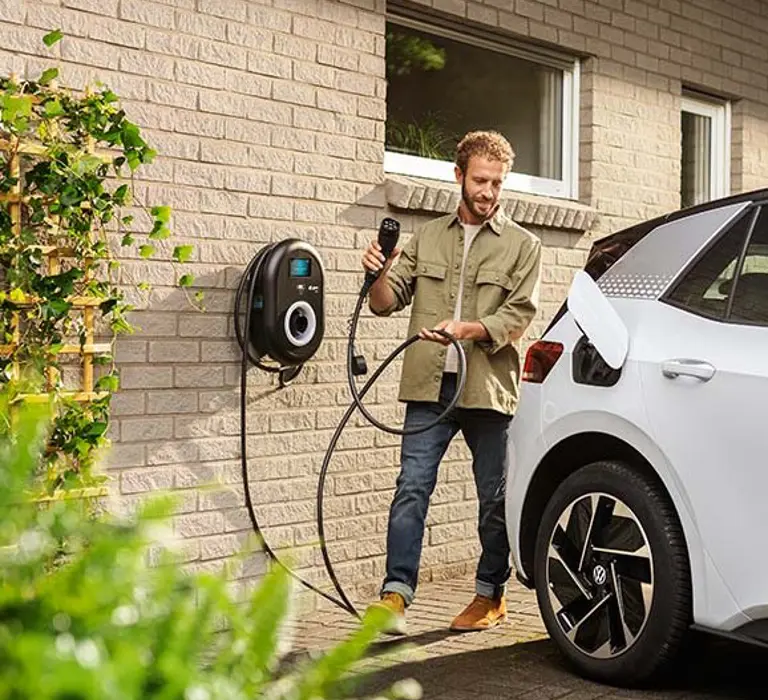As electric vehicles (EVs) continue to surge in popularity, the demand for home charging solutions is growing at a rapid pace. In this comprehensive guide, we'll delve into the essential aspects of home charging for electric vehicles, including types of chargers, installation considerations, and costs, to help you make an informed decision.
Types of EV Home Chargers
There are three main types of chargers for electric vehicles:
Level 1 Charging (Slow Charging)
Level 1 chargers are the slowest and most basic charging option, typically using a standard 3-pin UK plug (13 Amps) connected to a domestic power supply. These chargers are the least expensive option, but they provide a limited charging speed of around 2-3 miles of range per hour. Level 1 chargers are best suited for plug-in hybrid vehicles (PHEVs) with smaller batteries or as a backup option for pure electric vehicles (BEVs) during long trips.


Level 2 Charging (Fast Charging)
Level 2 chargers are the most common and recommended solution for home charging. These chargers require a dedicated circuit and are typically rated at 7kW or 22kW, providing a charging speed of 15-30 miles of range per hour. Level 2 chargers use a Type 2 connector, which is the standard charging port for most modern EVs in the UK.
DC Fast Charging (Rapid Charging)
DC fast chargers, also known as rapid chargers, are high-powered units that deliver direct current (DC) to the vehicle's battery faster than Level 1 or 2 chargers. These chargers are typically rated at 50kW or higher, allowing for 80% battery charge in under an hour. However, DC fast chargers are primarily found in public charging stations and are generally not suitable for residential installations due to their high cost and power requirements.

Installation of Home Charging Stations
Before installing a home charging station, consider the following factors:
Location
Choose a convenient and accessible location for your charging station, preferably close to your parking spot and within reach of your EV's charging port. The charging cable should be able to reach your vehicle without causing a tripping hazard or obstruction.
Electrical Capacity
Ensure your home's electrical system has the capacity to handle the additional load of an EV charger. Consult a qualified electrician to assess your home's wiring and circuitry and make any necessary upgrades.
Professional Installation
Always hire a certified and experienced electrician or a specialised EV charging installation company to install your home charger. A professional installer will ensure that the charging station is safely and correctly installed, adhering to local regulations and industry standards.
Charging Costs and Time
The cost and time required for charging your EV at home depend on several factors, including the charger's power rating, your vehicle's battery capacity, and your electricity tariff.
A typical 7kW Level 2 charger will charge a 60kWh battery to 80% in approximately 8 hours, while a 22kW charger will take around 3 hours for the same task. To calculate the cost of charging, multiply the battery capacity (in kWh) by your electricity tariff (in pence per kWh). Off-peak tariffs or a dedicated EV energy plan can help reduce your charging costs significantly.
Home EV Charging Solutions from Willow Leasing
At Willow Leasing, we've partnered with Go Zero to provide a range of EV charging solutions to cater to your specific needs.
Our smart chargers come with an array of advanced features that can help you optimise your charging experience. With the ability to connect to your Wi-Fi network, you can monitor and control your charging sessions remotely using a smartphone app. Some of the smart charger features include:
- Scheduled charging: Set your charger to operate during off-peak hours to take advantage of lower electricity rates.
- Charging history: Track your charging sessions, energy usage, and costs over time.
- Remote start/stop: Control your charging sessions from anywhere using your smartphone.
Compact Chargers
Compact chargers are designed for homes with limited space or where aesthetics are a priority. These chargers come in a sleek, compact design, providing fast and reliable charging without compromising performance.
Weatherproof Chargers
Weatherproof chargers are built to withstand harsh weather conditions, making them ideal for outdoor installations. These chargers come with a durable, weather-resistant casing that can protect the unit from rain, snow, and extreme temperatures.
In Conclusion
Installing a home charging station for your electric vehicle is a convenient and cost-effective solution that can help you make the most of your EV ownership experience. By understanding the different types of chargers, considering installation requirements, and exploring the home EV charging solutions offered by Willow Leasing, you can choose the best charging solution for your needs.
We hope this comprehensive guide has provided valuable insights into electric vehicle home charging. If you have any questions or require further assistance, please don't hesitate to reach out to our team of EV experts at Willow Leasing.
